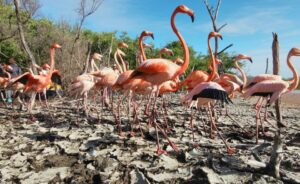The Ministry of Environment and Natural Resources (MMARN), in collaboration with the Manuel Valverde Podestá National Zoo and the organization Grupo Acción Ecológica, established an important milestone in the conservation of the Caribbean flamingo (Phoenicopterus ruber) with the successful release of 44 birds as part of the Pink Rescue project.
The Vice Minister of Protected Areas and Biodiversity, Federico Franco, expressed that “this flamingo release marks a significant step in our efforts to conserve the biodiversity of our region.”
“It is a call for active collaboration in the preservation of our common natural heritage,” he said, as he led the team of biologists and veterinarians who mobilized the birds in the early hours of Friday morning to spare them the stress of the day’s heat.
4th release of flamingos
Within the framework of this initiative, this is the fourth release of flamingos in the country by the project, 2 in the Dunes of Baní and 2 in the Manglares de Estero Balsa National Park, where the largest release of wildlife species in captivity in the country has taken place.
The Estero Balsa National Park is the most strategic area for the species where important nesting sites have been documented and where MMARN is reinforcing surveillance together with civil society organizations that support the project and the Dominican Navy.
 The release of the 44 flamingos was attended by nature photographer Juan Guzmán, Northern Regional Coordinator of the Protected Areas; biologist Marina Hernández, director of Biodiversity; veterinarian Indira Sánchez, in charge of the project, and the team of veterinarians from the Zoo as well as the administrators of the protected areas of Montecristi, in addition to a large part of their teams of park rangers, who committed to guarantee the integrity of the released birds in the normal process of adaptation to the area.
The release of the 44 flamingos was attended by nature photographer Juan Guzmán, Northern Regional Coordinator of the Protected Areas; biologist Marina Hernández, director of Biodiversity; veterinarian Indira Sánchez, in charge of the project, and the team of veterinarians from the Zoo as well as the administrators of the protected areas of Montecristi, in addition to a large part of their teams of park rangers, who committed to guarantee the integrity of the released birds in the normal process of adaptation to the area.
Previously, releases were also carried out in the Salinas de Baní, another relevant site for the species’ readaptation and introduction to its Caribbean habitats.
Franco valued the empowerment of the actors involved in the Rescate Rosado project, the constant dialogues to find solutions that favor the flamingo populations and, above all, the efforts of the teams of biologists, veterinarians and technicians who work to preserve their breeding and feeding areas.
The country needs more solidarity
He added that the country needs more and more solidarity to continue mobilizing “the talents and collective effort to repair the damage caused by human abuse of natural resources”.
“Each one of us has a vital role in this effort,” he added, while thanking the institutions involved in this initiative for their support and commitment to this noble endeavor.
The Rescate Rosado project arose as a response to the critical situation of this emblematic species, threatened by illegal trade and the degradation of its natural habitat. This initiative, which integrates several key conservation actors, has as its main objective to protect and preserve the Caribbean flamingo and its environment.
The Manuel Valverde Podestá National Zoo, an institution attached to MMARN, plays a crucial role in the recovery and rehabilitation of the rescued flamingos, ensuring their proper quarantine and preparation for their reintegration into their natural environment.
One of the key strategies of the project is the awareness-raising and active participation of the hotels, which undertake not to keep wildlife in captivity and to collaborate in campaigns to raise awareness of the importance of this species. In addition, they assume responsibility for the quarantine of the flamingos used in their facilities.
The Caribbean flamingo is an emblematic species that inhabits brackish water wetlands, marshes and estuaries in the region. Its conservation is essential to maintain the balance of these ecosystems and ensure a sustainable future for future generations.
Source: Presidencia.gob.do
Know More: Nature

